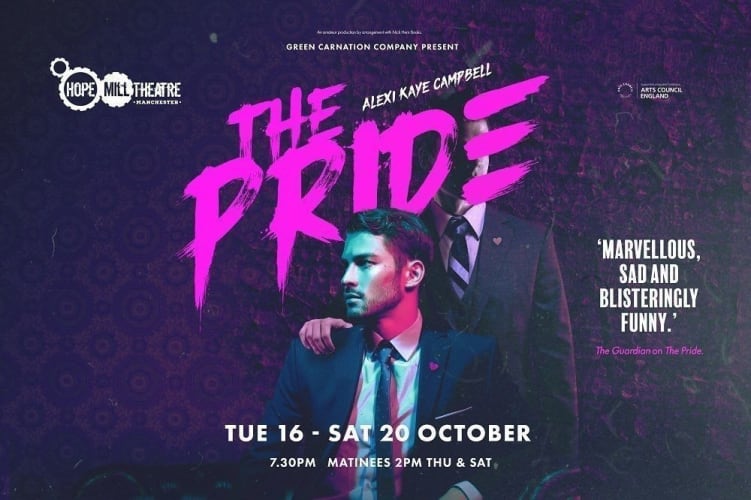Green Carnation is a new theatre company for Manchester and clearly not afraid of a challenge.
Their first production is Alexi Kaye Campbell’s The Pride—a complex drama/comedy assessing the impact of environment upon individuals and the need for people to be responsive to change. A repressive environment reduces sex to a shameful, squalid act while permissiveness makes sex a shallow, empty experience. The individual must find the pride to resist, rather than succumb to, the various pressures and remain true to their nature.
Plays concerning societal change can become heavy-handed with political points rammed home. The imaginative approach taken by Alexi Kaye Campbell, however, avoids this lack of subtlety. The Pride, set in the 1950s and in the present day, contrasts the lives of people who, to avoid persecution, must conceal their sexuality with those in a more permissive society who are free to celebrate their lifestyle.
In the 1950s, Oliver (Simon Hallman), a closeted gay author, mentions he has had an epiphany about a tolerant society in which people can be true to their natures. This is disconcerting for Philip (Gareth George) who, although married to Sylvia (Joanna Leese), is becoming aware that he is attracted to Oliver. In the present day, the actors play characters with the same names but in this time period Oliver is enjoying his sexual freedom so much he has become compulsively promiscuous and is unable to sustain a relationship.
Alexi Kaye Campbell’s point—that pressures generated by the wider environment can destroy individuals and people must be willing to take responsibility for resisting the forces and for changing their own behaviour—is well made but the play takes a very long time to get to the point. At over three hours, The Pride becomes something of an endurance test that hinders concentration. Co-directors Dan Jarvis and Dan Ellis are reluctant to challenge the lack of brevity and the languid scene changes that initially seemed atmospheric and charming start to wear thin.
Jarvis and Ellis are, however, able to capture a sense of time and place vividly. In the scenes set in the 1950s, the cast have rigid, robotic postures and speak in clipped, abrupt tones, while in the present day they slouch around dressed only in their underpants. Frankie Garrard’s set—whisky decanters and heavy drapes—has the elegance of a bygone age and allows for a significant and very funny surprise reveal at the end of the first scene.
The performances are excellent with Joanna Leese the personification of dignity under pressure maintaining a stiff upper lip as her marriage crumbles. Gareth George’s guilt-ridden, self-hating Philip illustrates the corrosive effect of repressing sexuality, showing how it reduces sex to brutal animal action without romance, and the consequences of trying to cope with the associated guilt.
Simon Hallman shows a sharp contrast between the characters of Oliver in the different eras. In the 1950s, Oliver is romantic, gently self-aware, willing to acknowledge his sexuality and timidly exploring the possibility of finding a lover. In the present day, Oliver is a self-deluding sex addict forcing himself to substitute sex for love and passion.
Although it is hard to accept that The Pride justifies the running time, it is a thoughtful atmospheric production with excellent performances and confirms that the Green Carnation Company is a very welcome addition to the Manchester theatre scene.
